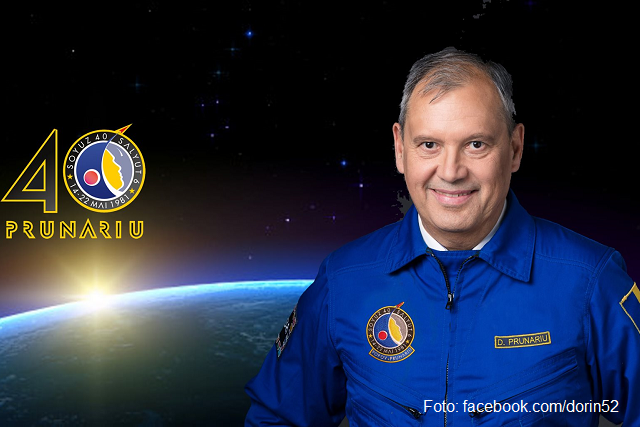40 years since the first flight of a Romanian in space
The Ministry of Foreign Affairs in Bucharest has recently hosted an event to mark 40 years since the first spaceflight of a Romanian cosmonaut

Corina Cristea, 16.07.2021, 13:00
In May 1981, Romanian Dumitru Prunariu and Leonid Popov’s Soyuz 40
docked with the Soviet orbital station Salyut 6. After 7 days, 20 hours and 42
minutes spent in outer space, the two cosmonauts safely landed in Kazakhstan on
May 22nd. The flight was part of the Soviet programme Interkosmos,
through which, the former USSR invited the socialist countries in Eastern
Europe and not only to participate with cosmonauts in joint space efforts.
Romanian Dumitru Prunariu has been the first and so far the only Romanian
cosmonaut, his mission being a landmark in Romania’s aeronautics history.
During an anniversary event staged by the Foreign Ministry in Bucharest four
decades later, cosmonaut Prunariu has recollected the flight conditions and the
experiments he conducted on board of the Soviet space laboratory.
Dumitru Prunariu: Our spaceflight included a
series of experiments initiated by Romanian scientists, from various research
institutes, most of them working for the Central Institute of Physics based in
Magurele at that time. Others were medical experiments, focusing on the way in
which the human body adjusts to weightlessness in space, experiments that were
carried on later after landing when a series of body measurements were made.
Scientists were also trying to assess the way in which the human body readjusts
to earth conditions after landing. Some of the experiments pertained to
astrophysics and the study of space radiation – I for instance took measurements,
with a digital device made in Romania, of the radiation level over various
regions of the planet, particularly mainly over South Atlantic. This region
arrested the scientists’ attention for the anomalies in the Earth’s magnetic
field. I registered here values of cosmic radiation 20 times higher than in the
other areas at the same altitude. I also studied the structure of heavy
particles at various altitudes, and did some technological experiments such as
the possibility of obtaining high purity materials to be used in the
electronics industry including in solar panels to produce energy in outer
space.
‘What impressed me the most upon reaching outer space was the thin
atmospheric layer. If you were to compare the Earth to an apple, the atmosphere
wouldn’t be thicker than its peel. It is almost shocking to understand the fact
that life developed and is going under that thin layer and that we, in our
ignorance, are polluting, poisoning what we are breathing and what we are going
to leave to the next generations to breathe while cutting down forests which
are the planet’s oxygen factory’, cosmonaut Dumitru Prunariu has further cautioned.
But what is the future of space exploration looking like? Is this future
going to belong to governments as in the past or is it going to be influenced
by the private initiative?
Here is again Romanian cosmonaut Dumitru
Prunariu: The future will
arguably be a cooperation between the two initiatives. As you see not only the
governments are investing in this field, as business opportunities have
developed in this domain as well and now Elon Musk is sending people to the
International Space Station. He is also building and testing a giant spacecraft
to carry infrastructure elements for a permanent moonbase and is also planning
to send crews of up to 20 people to the Moon and also to Mars. Elon Musk is a
visionary, an entrepreneur who knows how to use his money to both support the
US government in developing space activities, as he is cooperating with NASA on
most of his programmes, and to make profit, do business with the rockets he
built, which have exceeded by far the limits initially imposed by government
standards. They are reusable rockets and their cost is significantly lower. Two
years ago he covered about 20% of the total commercial launches of satellites.
Government agencies have followed suit started studying the possibility of
building reusable rockets to lower the costs of space exploration. At present
the cost to launch a kilogram of payload to space is somewhere around 15-20
thousand dollars, but it will decrease significantly in the future. Not only
Elon Musk but also Jeff Bezos, who is the world’s richest man, has been involved
in space exploration and is planning to send tourists into the orbit. He also
envisages suborbital spaceflights at affordable prices for the rich, somewhere
around a few hundred thousand dollars. Mars is also one of the main targets of
space exploration because scientists believe that life existed on that planet
long time ago. There are signs that water existed on Mars long before and it
still exists in various forms today. US rover Perseverance is presently looking
for ancient life in Jezero Crater where it landed on the Red Planet. A Chinese
spacecraft, which landed on the Moon is also doing the same kind of research in
a different area of the Earth’s natural satellite. Competition in the area of
space exploration will be forcing governments to cooperate with private
entrepreneurs. Even countries like China and Russia are encouraging the private
initiative in the area, although in these countries, government structures are almost
exclusively in charge of space exploration at this time. Private initiative
proved to have achieved more and fared better in this area than the limited
government structures, and that will eventually lead to development.
2021 is a great year in terms of anniversaries related to space
exploration. Besides the present event of marking 40 years since the first
spaceflight of a Romanian cosmonaut, two other landmarks in the history of
aeronautics are being celebrated: 70 years since the first manned space flight,
when Yuri Gagarin became the first man to fly into outer space (12th
April 1961) and 40 years since the flight of Columbia, the first space shuttle.






























